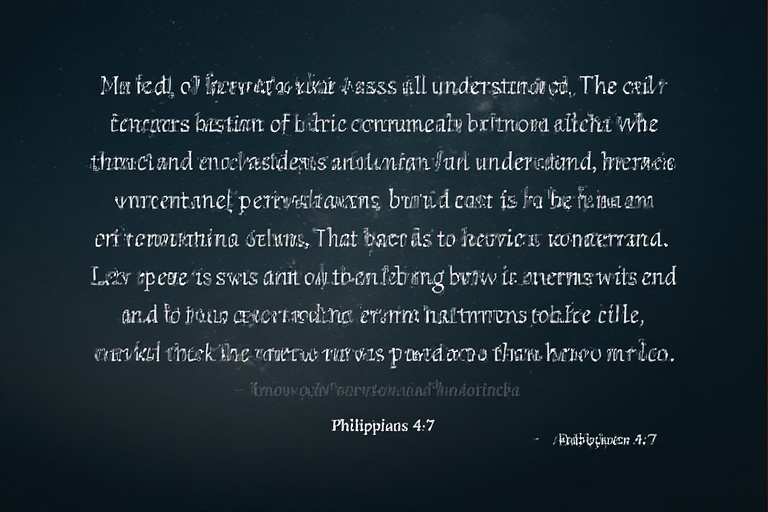
The Peace That Passes All Understanding: A Deep Dive into Divine Serenity
In a world often marked by chaos, stress, and uncertainty, the concept of the peace that passes all understanding emerges as a beacon of hope and solace. This biblical phrase, rooted in Philippians 4:7, encapsulates a state of tranquility that transcends human comprehension. It is a divine gift that calms the heart and mind, even amidst life’s most turbulent storms. This article explores the meaning, origins, and transformative power of the peace that passes all understanding, offering insights into how it can be experienced in everyday life.
What Is the Peace That Passes All Understanding?
The phrase the peace that passes all understanding originates from the New Testament, specifically Philippians 4:7, which states, “And the peace of God, which passeth all understanding, shall keep your hearts and minds through Christ Jesus” (KJV). This peace is described as a supernatural calm that defies logic or explanation. Unlike worldly peace, which often depends on favorable circumstances, the peace that passes all understanding is anchored in faith and trust in God.
This divine peace is not merely the absence of conflict but the presence of a profound sense of security and contentment. It is a peace that remains steadfast whether one is facing financial struggles, health challenges, or emotional turmoil. By embracing the peace that passes all understanding, individuals can find rest in the assurance that they are held by a higher power.
The Biblical Context of This Divine Peace
To fully grasp the peace that passes all understanding, it’s essential to understand its biblical context. The Apostle Paul wrote the Book of Philippians while imprisoned, yet his words radiate joy and serenity. In Philippians 4:6-7, Paul encourages believers to “be anxious for nothing” and to present their requests to God through prayer and thanksgiving. The result? The peace that passes all understanding guards their hearts and minds.
Paul’s circumstances—imprisonment, uncertainty, and hardship—make this message even more profound. His ability to experience the peace that passes all understanding in such conditions demonstrates that this peace is not contingent on external factors. Instead, it flows from a deep relationship with God, rooted in trust and surrender.
Why Does This Peace Surpass Understanding?
The phrase the peace that passes all understanding implies a peace so extraordinary that it defies human logic. It surpasses understanding because it exists independently of circumstances. For example, someone facing a devastating loss may still experience the peace that passes all understanding when they lean into their faith. This peace is not something the human mind can manufacture or fully comprehend; it is a gift from God that transcends rational thought.
This divine peace operates on a spiritual level, calming fears and anxieties that would otherwise overwhelm. It is a peace that allows individuals to face life’s uncertainties with courage and hope, knowing that they are not alone. The peace that passes all understanding is a testament to the power of divine intervention in human lives.
How to Experience the Peace That Passes All Understanding
Experiencing the peace that passes all understanding requires intentional steps to cultivate a deeper connection with God. Here are some practical ways to invite this peace into your life:
1. Prayer and Supplication
Prayer is a powerful tool for accessing the peace that passes all understanding. Philippians 4:6 encourages believers to bring their worries to God through prayer. By laying burdens at His feet, individuals open their hearts to receive the peace that passes all understanding. Prayer is not about changing circumstances but about aligning one’s heart with God’s will.
2. Thanksgiving
Gratitude shifts perspective. Even in difficult times, giving thanks for God’s faithfulness fosters the peace that passes all understanding. By focusing on blessings rather than problems, individuals can experience a sense of calm that transcends their challenges.
3. Trust in God’s Sovereignty
Trusting that God is in control is central to experiencing the peace that passes all understanding. This trust involves surrendering the need to control outcomes and believing that God’s plan is good, even when it’s not fully understood.
4. Meditation on Scripture
Scripture is a source of comfort and guidance. Meditating on verses like Philippians 4:7 or John 16:33, where Jesus promises peace, can anchor the soul in the peace that passes all understanding. God’s Word provides reassurance that transcends human reasoning.
5. Community and Fellowship
Surrounding oneself with a supportive faith community can amplify the peace that passes all understanding. Sharing burdens and encouraging one another strengthens faith and fosters a collective sense of divine peace.
The Transformative Power of Divine Peace
The peace that passes all understanding is not a fleeting emotion but a transformative force. It reshapes how individuals respond to life’s challenges, enabling them to face adversity with resilience. For instance, someone battling anxiety might find that the peace that passes all understanding calms their racing thoughts, allowing them to focus on the present moment.
This peace also fosters emotional and spiritual growth. It encourages forgiveness, patience, and compassion, as those who experience the peace that passes all understanding are better equipped to extend grace to others. Moreover, this peace can inspire hope, reminding individuals that their circumstances do not define their worth or future.
Real-Life Examples of the Peace That Passes All Understanding
Throughout history, countless individuals have testified to experiencing the peace that passes all understanding in remarkable ways. Consider the story of Corrie ten Boom, a Holocaust survivor who found peace amidst unimaginable suffering. Despite the horrors of a concentration camp, Corrie clung to her faith, experiencing the peace that passes all understanding that sustained her through loss and trauma.
In modern times, people facing terminal illnesses or personal crises often share similar stories. A cancer patient might describe how the peace that passes all understanding gave them strength to face treatments with hope. A parent grieving the loss of a child might find solace in the peace that passes all understanding, enabling them to carry on with purpose.
These examples illustrate that the peace that passes all understanding is not an abstract concept but a tangible reality that can transform lives. It is a peace that defies logic, offering hope where despair might otherwise reign.
Cultivating a Lifestyle of Peace
To make the peace that passes all understanding a consistent part of life, one must adopt a lifestyle rooted in faith and mindfulness. This involves daily practices like prayer, gratitude, and scripture reading, as well as intentional efforts to trust God in all circumstances. Over time, these habits create a foundation for experiencing the peace that passes all understanding even in the most trying moments.
Additionally, letting go of worry and embracing surrender is key. Jesus Himself said, “Peace I leave with you; my peace I give you” (John 14:27). By accepting this gift, individuals can cultivate a life marked by the peace that passes all understanding.
Conclusion
The peace that passes all understanding is a divine gift that offers hope, strength, and serenity in a world filled with uncertainty. Rooted in faith, prayer, and trust in God, this peace transcends human comprehension, guarding hearts and minds against life’s storms. By embracing practices like gratitude, scripture meditation, and community, anyone can experience the peace that passes all understanding and live a life marked by divine tranquility.
This peace is not reserved for a select few but is available to all who seek it with an open heart. As you navigate life’s challenges, may you find the peace that passes all understanding and let it guide you toward a deeper, more fulfilling relationship with God.
FAQs
What does “the peace that passes all understanding” mean?
The peace that passes all understanding refers to a divine sense of calm and security that transcends human logic. It is a gift from God, described in Philippians 4:7, that guards hearts and minds, even in difficult circumstances.
How can I experience this peace in my life?
You can experience the peace that passes all understanding through prayer, gratitude, trusting in God’s sovereignty, meditating on scripture, and engaging in a supportive faith community.
Is this peace only for religious people?
While the peace that passes all understanding is rooted in Christian theology, anyone open to exploring faith and spiritual practices can experience a similar sense of divine calm by seeking a connection with a higher power.
Can this peace help with anxiety or stress?
Yes, the peace that passes all understanding can provide profound relief from anxiety and stress. By surrendering worries to God and focusing on His promises, individuals often find calm amidst turmoil.
How is this peace different from worldly peace?
Worldly peace often depends on favorable circumstances, such as financial stability or good health. In contrast, the peace that passes all understanding is a supernatural gift that remains steady regardless of external conditions.





